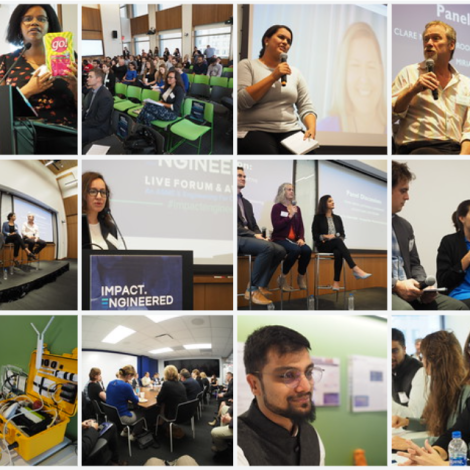A three-year process culminated in the release of revisions to the Graduate Attributes and Professional Competencies Framework this year, and the International Engineering Alliance and its collaborators should be commended for meeting many of the global community’s expectations. Tensions had mounted as thought leaders called for deeper reform to the engineering educational standards. The framework had not meaningfully changed since the 1990s and the current revision promised to be historic in scope. The result, a revision developed with input from UNESCO and the World Federation of Engineering Organizations, seems to have captured many, if not all, of the items on our wish lists.
Analysis: Five Questions With Mark Abbott: Critically Thinking the New Graduate Attributes Framework
“It’s pretty huge to see the 33 member nations, which will now be adapting their own professional frameworks and accreditation of engineering degrees, redefine engineering in this way,” says Eleanor Loudon, Chief Executive Officer Engineers Without Borders Australia. “These changes speak directly to the great work organizations like EWB and E4C have been doing with communities for decades, and resonate with the skills we’ve been aiming to build in ourselves and through our education programs for years.”
Members of EWB organizations gave feedback to the developers of the revisions and Ms. Loudon was involved in the publication of this open letter by EWB-International calling for greater reform.
Included: The Sustainable Development Goals
The United Nations’ Sustainable Development Goals are close to the heart of our work at Engineering for Change, and we are pleased to see the SDGs take a place in the new educational standards for engineers. The SDGs now appear in the Knowledge and Attitude Profile, Graduate Attributes, and Professional Competence Profiles Tables.
“The revisions to the new framework are important and well overdue. The need for engineers to be aware of the UN Sustainable Development Goals seems timely and appropriate,” says Dr. Ashley Huderson, Director of Engineering Education and Outreach at the American Society of Mechanical Engineers. (ASME is the parent organization of Engineering for Change.)
Included: Ethics and inclusivity
The impact of design and technology on people and the environment is a top priority and well-trodden ground in global development circles. Now the contemplation of ethics is codified in the engineering education standard. As is diversity and inclusivity.
Included: Critical thinking
EWB-International’s open letter in 2020 stated the case for an element of critical thinking in the engineering education. The final revision of the standards appears to have prioritized that need, acknowledging the importance of critical thinking, innovation, emerging technologies and lifelong learning requirements.
“These changes recognize that all engineering, regardless of the context, has the capacity to contribute to, or detract from, the sustainable development agenda and that engineers have a responsibility to manage these broader impacts. To fulfil this role, engineers will need to reflect critically on their role and acknowledge that they are socio-technical, rather than purely technical, professionals,” Ms. Loudon says.
A mention of ‘critical thinking’ may not be enough
EWB International’s open letter called on the revisions to help train engineers who are aware of the responsibility inherent in their profession. “A key component is missing,” the letter reads, from the revisions as they were in 2020. “To address this century’s complex problems, engineers must also be able to reflect on and think critically about the role of engineering itself.”
The final draft may yet have missed that target.
“Both the previous and new versions of the Grad Attributes and Professional Competencies assume an underlying shared understanding of what is engineering that doesn’t actually exist. As a result, they can be interpreted radically differently based on the reader’s underlying assumptions about what is and isn’t engineering,” says Mark Abbott, Executive Director of the Engineering Change Lab in Canada and one of the collaborators on EWB’s open letter.
“I believe the answer is not to seek to put in place an ironclad definition of ‘engineering,’ but rather to ensure that every engineer is reflecting on this question for themselves,” Mr. Abbott says. “Just saying ‘critical thinking’ is not enough. It [the GAPC] should be more explicit that we need critical thinking about the role of engineering and its outcomes.”
Thoughts on implementation
The revised GAPC framework provides a starting point for organizations that train the global engineering workforce. Many of those organizations will be needed to implement the attributes on a global scale, including standards development agencies, accreditation bodies, industry and academic institutions. The framework is not prescriptive, meaning that the integration of the new attributes will require voluntary development of new or revised standards and performance indicators.
This is where organizations like Engineering for Change can play a role. This platform enables global conversation about approaches and mobilization of efforts, acting as an important component in the implementation process.
“E4C reaches more than one million people around the world who believe in the power of engineering to drive sustainable development. We are committed to socializing the revised framework and catalyzing implementation worldwide through collaboration with our growing academic network and founding engineering associations,” E4C’s President Iana Aranda says.
This organization is uniquely situated within the Engineering Global Development group at the ASME, which Ms. Aranda directs. The arrangement allows us to work closely with the Accreditation Board for Engineering and Technology (ABET) supported by ASME’s Engineering Education and Outreach team to advocate for implementation across rising programs.
“E4C has been rigorously training engineers since 2014 through programs such as our E4C Research Fellowship to apply their skills to achieve the UN Sustainable Development Goals. We plan to leverage the revised framework within our own impact evaluation strategy and share the outcomes to further catalyze adoption in our sector,” Ms. Aranda says.

